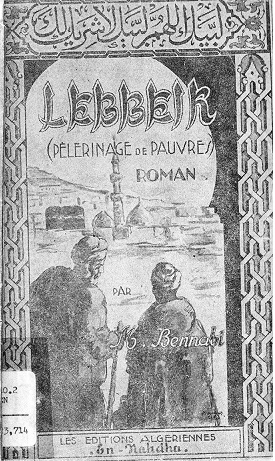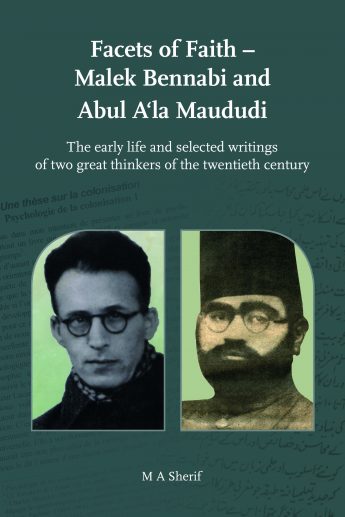Lebbeik, Pilgrimage of the Poor

Bennabi’s novella of redemption and solidarity, Lebbeik, Pèlerinage de Pauvres (‘Lebbeik, Pilgrimage of the Poor’), was probably written around 1938, though not published till 1947-48 by En-Nahdha, Algiers. It is based on a sea journey from the Algerian port of Bône (now Annaba) to Jeddah. The novel has a didactic quality and preceded his famous Le Phénomène Coranique. His mother’s accounts of her hajj some years earlier had moved him to tears, and he was also familiar with Bône, from many travels to and from Marseille.
Click here for an introduction and three extracts
Click here for an obituary by Rabie H. Ahmed – Impact International, December 1973.
Click here for an interview Speaking about the Algerian Revolution – Impact International, February 1973

click here.
Other recent scholarship on Bennabi
Malek Bennabi, ‘Père’ due courant Islamique Mondial? Les fiches confidentielles des services secrets francais. Zidane Meriboute (Erick Bonnier, 2020) click here.
La vocation civilisationnelle de l’islam dans l’œuvre de Malek Bennabi, Jamel El Hamri, Paris, Cerf, 2020, pp. 319. [for a review by Nasser Michaëlen-Gabryel, click here]
Ramadan

The month of Ramadan is an interval in Time. It is its moment of systolic or diastolic heartbeat. Whichever, the interval marks the annual, cyclical return of the sacred. Life is sacred. This is to be reaffirmed, to give man a sense of fulfilment on earth. It fills his soul like a sail billowed by the breezes from the great tempests of history.
As soon as life loses this characteristic, the winds cease to blow and the sail distends in a placid sea from which nothing of importance may come forth.
There is need to recapture the winds; there is need once more to hoist the fallen sail. The pagans of the Jahiliyya, with their own sense of the sacred, interdicted any profanation for three months of the year: Islam consecrated the first of these for fasting, with the name of Ramadan.
Present day civilisation is knowingly and systematically removing the sacred from life and promoting what is not sacred and profane in the pretext of liberation and empowerment of the soul. We know the price that these most civilised countries are paying for removal of the sacred. Today’s technology sings glory to the deity of Matter; a primitive song that desacralises the world in the pretence of providing an objective explanation.
At the end of the twentieth century, Ramadan must foremost be a discreet invitation to the eight hundred million Muslims within the rest of humanity to get back up the gradient from which to engage with technology and retake it – to tear it away from this intense profanation that is endangering our environmental biosphere from which emanates life.
And through this, the invitation becomes an indirect call to the sacred throughout the world; a moment of regeneration of the original conscience of humanity before it was soiled by all the nihilist philosophies.
But above all, Ramadan is the month of regeneration of the Muslim himself; it is regeneration in the dual sense of the word. Firstly physically, because one gains the beneficial affects of this double revolution of the physiological system: the first day of fasting is the first day of celebration – but on this point let us leave the explanation to the doctors. Secondly morally, because one is revived by abstinence and the gatherings in mosques; the great moment in Ghar Hira, when the first verse of the Qur’an was revealed.
Note: Malek Bennabi (1905-1972) was an Algerian scholar-activist who ranks amongst the leading Muslim twentieth century men of ideas. For a biographical account of his early life, see Facets of Faith – Malek Bennabi and Abul Aʻla Maududi, The early life and selected writings of two great thinkers of the twentieth century by M A Sherif. Islamic Book Trust, Kuala Lumpur, 2018
His famous works include:
Colonisabilité – Problèmes de la civilisation, Algiers: Dar El-Hadhara, 2003.
Idée d’un commonwealth islamique, Alger: El-Borhane, 2006.
Le Phénomène Coranique, Essai d’une theorie sur le Coran, Algiers: Mosquee des Etudiants de l’Université d’Alger, not dated, probably in the 1940s, though his first manuscript was lost during World War II, which he then rewrote in 1945.
Lebbeik, Pélerinage de Pauvres, Alger: En-Nahda, 1948.
Les conditions de la renaissance, El-Borhane: Algiers, 2009
Les Grands Themes, Algiers: El Borhane, 2005.
Mémoires d’un Témoin du Siécle, Alger: Samar, 2006. (Includes Les Carnets).
Mondialisme, Alger: Dar e; Hadhara, 2004.
Pourritures, Alger: Dar el oumma, 2007.Vocation de l’Islam, Algiers: ANEP, 2006. The first edition of Vocation was published in Paris by Éditions Du Seuil in 1954.
